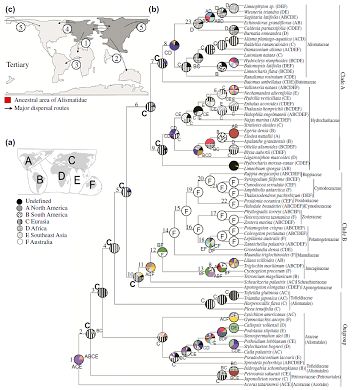
Alismatidae is a monocot group with a worldwide distribution, consisting of 12 families, 56 genera, about 500 species, and all marine angiosperms. Geographical origin of the group is an interesting topic for biogeographers, and the group provides an ideal model for investigating the evolution mechanization from land environment to aquatic (marine) environment.
The Adaptive Evolution of Aquatic Plants Research Group in Wuhan Botanical Garden (WBG), led by prof. WANG Qingfeng, has explored the phylogeny and ancestral distribution of Alismatidae based on chloroplast sequences and comprehensive samples.
The results suggested that the most recent common ancestor of Alismatidae most probably occurred in Eurasia, followed by a split into two major clades. The clade comprising Hydrocharitaceae, Butomaceae and Alismataceae mainly diversified in Eurasia and Africa. The other clade comprising the remaining families dispersed to southern hemisphere, and mainly diversified in Australian area. The dispersal event from southern Asia to Australia (across the ocean systems of the western Pacific) presented the habitat changes from fresh water to salty water crucial for seagrass development.
The results shed light on understanding the origin of Alismatidae, evolution mechanization from land environment to aquatic (marine) environment.
This work was published in Molecular Phylogenetics and Evolution (2013, 67: 38-42). It was supported by grants from One Hundred Person Project of the Chinese Academy of Sciences (KSCX2-YW-Z-0805), Strategic Pilot Science and Technology Projects of the Chinese Academy of Sciences (XDAO5090305).

Biogeography of Alismatidae (Image by WBG)

86-10-68597521 (day)
86-10-68597289 (night)

52 Sanlihe Rd., Xicheng District,
Beijing, China (100864)

